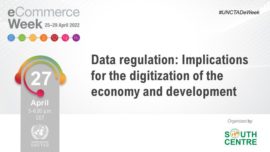eCommerce Week 2022: Data governance, 28 April 2022
UNCTAD eCommerce Week 2022: Data and Digitalization for Development
Exploring a global framework for data governance
Organized by South Centre and IT for Change
28 April 2022, 5-6.00 PM (CET)

UNCTAD eCommerce Week 2022: Data and Digitalization for Development
Exploring a global framework for data governance
Organized by South Centre and IT for Change
28 April 2022, 5-6.00 PM (CET)

UNCTAD eCommerce Week 2022: Data and Digitalization for Development
Data regulation: Implications for the digitization of the economy and development
Organized by South Centre
27 April 2022, 5-6.00 PM (CET)

Climate change and trade: what policies for environmental goods and services?
Carlos Correa, Executive Director, South Centre
International conference on “Climate Change and Sustainable Development”
26-27 March 2022, Cairo, Egypt
While the importance of protecting the environment in the context of trade policies is firmly recognized, a key question is the extent to which trade disciplines aimed at protecting the environment can reach their intended or declared objectives and affect the trade interests and economic growth prospects of developing countries. Developing countries are also among the most affected by climate change and, hence, they have a major interest in international action to address it. However, the intensification of environmental threats faced by developing countries is not of their making, and advancing an agenda -with no evidence that it would lead to reduced emissions- is likely to just disadvantage the developing world which has the least responsibility historically for today’s climate-related damages. Given this history, as well as the tight external constraints imposed on their efforts to mobilize resources, developing countries cannot be expected to either successfully mitigate climate change or adapt to climate change, without significant financial and technological support. The South Centre has been assessing the policy implications that the initiatives on trade and environmental sustainability will have for the Global South.
Session 28: Investment Facilitation for Development: Identifying key policy issues for facilitating responsible, inclusive and resilient investment
Friday, December 3, 2021, 3:00 PM – 4:15 PM CET, Virtual
Investment facilitation policies can support States’ efforts to achieve sustainable development, but they cannot be considered in isolation. This session will raise some considerations on the Structured Discussion on Investment Facilitation discussion in the WTO and bring additional perspectives on the need to safeguard the right of countries to adopt the necessary measures to articulate and apply policies designed to achieve inclusive, equitable, fair and sustainable development and enabling and advancing sustainable investments that add value to the developmental process of host States.
The Ocean Economy: trends, impacts and opportunities for a post COVID-19 Blue Recovery in developing countries
by David Vivas Eugui, Diana Barrowclough and Claudia Contreras
This paper discusses preliminary and still quite unknown trends on trade, finance, and technology of the ocean economy, outlines key impacts and measures taken to respond to the COVID-19 pandemic and raises awareness about the potential of the ocean economy to contribute to a sustainable and resilient recovery. Based on these findings, the paper argues that sustainability and resilience considerations should be more highly prioritized in ocean-based value chains in a post COVID-19 recovery. To support this, the paper highlights the importance of securing sufficient and reliable long-term investment and the creation of capacities to develop new and adapt existing service innovations. It calls for a global trade, investment and innovation Blue Deal as sister to the Green New Deal already gaining support around the world, particularly for developing countries.
Emerging Trends in FTAs and Public Health: Are the EU, USA, and China shifting positions?
Thursday, 7 October 2021
16:00 – 17:30 CET
The South Centre is holding a series of webinars on emerging trends related to free trade agreements (FTAs) and investment agreements that impact public health. The goal is to generate awareness, share experiences and expand knowledge for academics, policymakers and negotiators in ongoing and/or future negotiations. After our first webinar focused on investment treaties and IP, we this webinar examines the EU, USA, and China’s recent experiences.
Emerging Trends in FTAs and Public Health: Investment Agreements and Intellectual Property
Friday, 28 May 2021 – 16:00-17:30 (CET)
The inclusion of TRIPS-Plus provisions in developing country IP laws, as a result of negotiations of free trade agreements (FTAs) continues to be of concern. In addition, there are various emerging areas that require attention from developing countries, where accumulated knowledge and institutional learning are more limited. These include investment agreements that include ‘intellectual property’ as a category of investment – with subsequent ISDS mechanisms, as well as competition and investment chapters or agreements that may restrict the policy space, such as the China-EU Comprehensive Investment Agreement. There are several important developments to consider for the upcoming years. New negotiations in the period of Covid-19 crisis, when countries are in dire financial situations, may lead to even more unbalanced negotiations. The UK is pursuing new agreements after Brexit with developing countries, while the USA has signaled renewed attention to multilateralism and at the same time is continuing to make use of Section 301 of its trade law to advance reforms in third countries. The AfCFTA negotiations of the intellectual property chapter are set to start this year. Moreover, the RCEP Agreement is to be implemented via national law amendments and attention must be given in particular to the process for Least Developed Countries (LDCs) and the technical assistance offered.
In this context, the South Centre is holding a series of webinars on emerging trends related to free trade agreements (FTAs) and investment agreements that impact public health. In this first session, we will discuss the topic of investment agreements and intellectual property, including varied angles to the issue, such as perspectives for post Covid-19 agreements, the legal construction of IP as a category of investment, the challenges of ISDS and policy reform options, and the analysis of a concrete case.
Technology and inequality: can we decolonise the digital world?
By Padmashree Gehl Sampath
In this article, the author argues that techno-centric explanations of progress and industrialisation are deeply entrenched in a wider social context that encourages us to ignore the historical roots of current inequalities – which, in fact, are not amenable to a technological solution alone. Making the data economy work for all will require a serious reflection on how we want to frame this debate, and how to align ourselves to a common vision of social progress that technology could help to accomplish.
A New Trend in Trade Agreements: Ensuring Access to Cancer Drugs
By Maria Fabiana Jorge
A World Health Organization (WHO) report on cancer indicates that the cancer burden will increase at least by 60% over the next two decades, straining health systems and communities. Companies develop cancer drugs in part because payers are less resistant to paying high drug prices for these drugs. As Barbara Rimer, Dean of the University of North Carolina and Chair of the U.S. President’s Cancer Panel stated, “[m]ost cancer drugs launched in the United States between 2009 and 2014 were priced at more than $100,000 per patient for one year of treatment.” Many of the new cancer drugs are biologics. Such prices are clearly out of reach for most patients who will need them increasingly more to stay alive. While competition is critical to ensure lower drug prices, we have seen a number of strategies, including through trade agreements, to prevent competition and extend monopolies over these drugs and their very high drug prices. It is no accident that the exclusivity granted to biologic drugs has been one of the most conflictive provisions in recent trade agreements such as the United States-Mexico-Canada Agreement (USMCA) and the Comprehensive and Progressive Agreement for Trans-Pacific Partnership (CPTPP). Nevertheless a new trend in trade agreements started in 2007 when U.S. Members of Congress pushed back against the interests of powerful economic groups seeking longer monopolies for drugs. These Members of the U.S. Congress prevailed then in restoring some balance in the trade agreements with Peru, Colombia and Panama and further consolidated this new trend in 2019 in the USMCA. Moreover, following the U.S. withdrawal from the original Trans-Pacific Partnership (TPP), the negotiators of the remaining 11 countries also pushed back to ensure a better balance between innovation and access in the CPTPP. People around the world need to be aware of these precedents and ensure that they also work for access to medicines for their own citizens.
United States: An Obsolete Trade Practice Undermines Access to the Most Expensive Drugs at More Affordable Prices
By Maria Fabiana Jorge
Access to affordable drugs is a top policy priority for the United States with real bipartisan support but it increasingly seems to be an unreachable goal, in part, due to conflicting government policies. While the Administration’s Blueprint to Lower Drug Prices and Reduce Out-of-Pocket Costs highlighted the importance of competition to ensure lower drug prices, U.S. trade policy in general, and the Special 301 Annual Review in particular, do exactly the opposite: broaden and lengthen the monopolies granted to pharmaceutical companies thus delaying or deterring the launch of generic and biosimilar drugs and with that, the chances of lowering drug prices. The pharmaceutical industry has changed a great deal in the past 30 years, among other things by developing complex biotechnology drugs that while critical for the treatment of illnesses such as cancer, are out of reach for many patients. While some parts of the government are trying to increase access to medicines through competition provided by generic and biosimilar drugs, their efforts are being undermined by a trade policy that was defined 30 years ago. It is time to adjust U.S. trade policy to the realities of 2020 and stop acting as if it was still 1989.
The Covid-19 Pandemic and Liability under Investment Treaties
By Muthucumaraswamy Sornarajah
COVID-19 can increase liability for countries under international investment treaties. Professor M. Sornarajah, Emeritus Professor at the National University of Singapore, discusses in this SouthViews the imminent challenges faced under such treaties by developing countries. The text is based on his presentation at the South Centre webinar on “Responsible Investment for Development and Human Rights: Assessing Different Mechanisms to Face Possible Investor-State Disputes from COVID-19 Related Measures” held on 30th July 2020. The recording of the webinar is available here: https://www.youtube.com/watch?v=yXPswKuywvA
Trade Measures Adopted by Countries in Response to COVID-19
In response to the COVID-19 pandemic, many WTO members have adopted several measures affecting trade. Some are trade liberalizing; others are trade restrictive. South Centre has elaborated a worksheet that compiles these measures (updated till 16 April) based on available sources of information. The compilation does not intend to be exhaustive. However, it may help members to have information about the landscape of trade measures that may affect them.